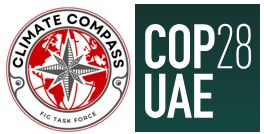News in 2024

|
Geospatial and Land Management Professionals: Driving Climate Action
30 November - 13 December 2023, Dubai UAE
Insights from COP 28 by FIG Climate Compass Task Force members Naa
Dedei Tagoe and Simon Ironside

At the 28th Conference of the Parties (COP 28) in Dubai from 30
November to 13 December 2023 in Expo City, Dubai, United Arab Emirates,
delegates from across the globe convened with a singular purpose - to
confront the pressing challenge of climate change head-on. This pivotal
gathering marked a significant milestone in global efforts to address
climate change, presenting unparalleled opportunities for professionals
from diverse sectors to contribute to the fight against climate change.
In this article, we delve into the key highlights of COP 28 and explore
the pivotal role that professionals in the geospatial and land
management industry can play in shaping the global climate agenda.
One of the standout achievements of COP 28 was the historic agreement
signalling the "beginning of the end" for the fossil fuel era, a
critical driver of climate change. This landmark consensus, reached for
the first time in almost three decades of international climate
negotiations, underscores the urgent need for a swift transition to
renewable energy sources and sustainable land management practices.
While not directly within the realm of geospatial and land management,
this transition highlights the crucial role of geomatics and geospatial
data in identifying suitable locations for renewable energy
infrastructure and monitoring the ecological impacts of energy
transitions.
Additionally, COP 28 saw the operationalization of funding
arrangements for addressing loss and damage caused by climate change.
This development presents significant opportunities for geomatics,
surveying and spatial information professionals to contribute to risk
assessment, disaster preparedness, and post-disaster recovery efforts.
Geospatial technologies can play a vital role in assessing the extent of
damage caused by climate-related events and identifying vulnerable areas
prone to loss and damage.
Furthermore, parties at COP 28 agreed on targets for the Global Goal
on Adaptation (GGA) and its framework, highlighting the importance of
adaptation planning and strategies supported by geospatial data and
remote sensing technologies. Geospatial professionals can make
substantial contributions to resilience-building efforts by providing
spatial data for vulnerability assessments, land-use planning, and
infrastructure development in climate-sensitive areas.
By emphasizing the crucial link between climate action and
biodiversity conservation, COP 28 underscored the significance of
conserving and restoring ecosystems. This presents unique opportunities
for professionals to leverage remote sensing data for forest monitoring,
biodiversity assessments, and carbon mapping. Geospatial professionals
play a pivotal role in monitoring changes in land cover, deforestation
rates, and carbon stocks, thereby supporting efforts to conserve natural
resources and mitigate climate change.
In conclusion, COP 28 serves as a rallying call for collective action
to address climate change and build resilience in the face of
environmental challenges. Geospatial and land management professionals
are poised to lead this charge, armed with the necessary tools and
expertise to drive meaningful change. As we navigate the complexities of
climate change, collaboration, innovation, and advocacy will be
paramount. Together, let us rise to the challenge and seize the
opportunity to create a healthier, more resilient planet for generations
to come.
More information
FIG Working Week 2024 that wil take place 19-23 May 2024 includes
several sessions with a climate agenda. Read more at
www.fig.net/fig2024 and
register now
Read more about
FIG Climate
Compass Task Force
Simon Ironside and Naa Dedei Tagoe
FIG CLimate Compass Task Force members
March 2024

























